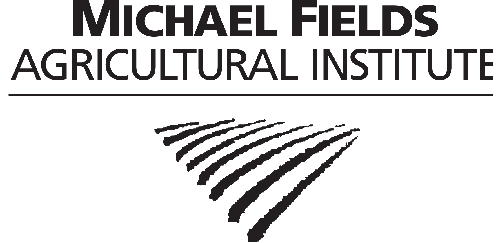Midwest GRIT: Women Farmers Join Michael Fields’ Agroecologist Nicole Tautges for a Hands-on Equipment Field Day
East Troy, WI - Clear blue skies and a balmy 70 degrees in late October graced the women farmers who gathered at MFAI North Farm. Led by MFAI’s Agroecologist, Nicole Tautges, a small group of women came together to learn and gain hands-on experience driving tractors and some of the necessary implements to raise culinary grains on their farms. As participants of the inaugural program, Midwest GRIT (Grains Resource & Immersive Training), this field day conveyed the diverse range of skills required for farmers to compete and succeed in a regional grainshed market. “Outside of farm apprenticeship or a family operation [willing parent] to teach you these skills, there is limited opportunity for [farmers] to learn equipment use,” says Tautges.
Over the four-hour workshop, five farmers, Michelle & Morgan (Larryville Gardens, Burlington, WI), Vickie (LaGrange, IL), and Iris & Wenona (Hempful Farms, Burlington, WI), watched demonstrations, and practiced equipment safety, tractor operation, implement hook up methods, and no-till drill operation. Tautges, who did not grow up on a farm herself, reflected on how she learned equipment operation: “The most critical aspects for productive learning around farm equipment operation require a patient teacher and high expectations [for meeting your goals].” Tautges gained her first experiences with equipment during graduate school at Washington State University, receiving a degree in Crop Sciences while researching organic wheat production, and thrived in a setting where her peers and technicians gave brief introductions to the tools required for field study with no exceptions made for experience or gender. To her, all you need is an “independent streak and to be able to get over fear that you might break something; be open minded learning new skills.”
For others, the risk involved may seem a little overwhelming. Field and equipment safety is crucial for skill development and confidence building. Understanding pinch points, where to stand on ground, and the severe reality of tractor rollovers are all part of the equation when it comes to jumping onto a piece of heavy machinery. As more women step into ownership and leadership roles on farm enterprises, they are using these implements and sometimes need to use different methods for working with equipment that was not designed with their operation considered - this can involve learning methods using longer levers to loosen over-tightened bolts, nuts, and other fasteners, or by relying more on working as a team for heavy tasks, such as PTO hookups. This partnership in learning and working was exemplified during the field day, and may prove to be an important tool in new women farmers’ toolboxes, as more and more women farmers scale up their farms and need to employ larger pieces of equipment.
Continuing opportunities like these are just one of the first steps to success in the field and take time. Upon arriving at MFAI, Tautges was trained on specific equipment by former MFAI employee and current board member, John Hall, and she continues to build her skills with equipment from partners in the region. Shifting perspective on asking for help or relying on others takes practice, just like calibrating a grain drill. “[It was] extremely rewarding to see women farmers gain confidence in equipment operation and to take one small step towards addressing the lack of parity between male and women farmers. I’d like to see more women push themselves to show up for these types of opportunities,” Tautges said
New opportunities continue to appear. MFAI & Midwest GRIT look forward to announcing the new online equipment sharing platform, Equipage that will give beginning farmers opportunities to share equipment without taking on massive capital investments, and allow long-time farmers to increase their income needs and share layed equipment with their communities. Tautges commented, “As a millennial it feels strange to rely on an ad-hoc system where you have to call people you may not know [neighbors and removed acquaintances] to borrow equipment; in the modern day, we often find ourselves reaching to internet communities.” Sharing experiences and knowledge is just another piece of the puzzle for a thriving agricultural community & foodshed.
Midwest GRIT is continuing over the next year and MFAI welcomes new beginning farmers into the fold, especially those wanting to engage in workshops like the one above. We plan to hold more equipment operation and hands-on workshops. Learn more about Midwest GRIT and workshop opportunities by vising https://www.midwestgrit.org, or calling us at (262) 642-3303.
Midwest GRIT is a peer-learning program with a goal to increase the number of successful, resilient food-grade grain farmers using organic practices in the Upper Midwest. The program welcomes women, non-binary, and BIPOC food-grade grain farmers. A project of Michael Fields Agricultural Institute (MFAI), in partnership with the Artisan Grain Collaborative (AGC), and The Organic Grain Resource and Information Network (OGRAIN), Midwest GRIT supports farmers through education, peer-to-peer learning, relationship development, and resource sharing.





